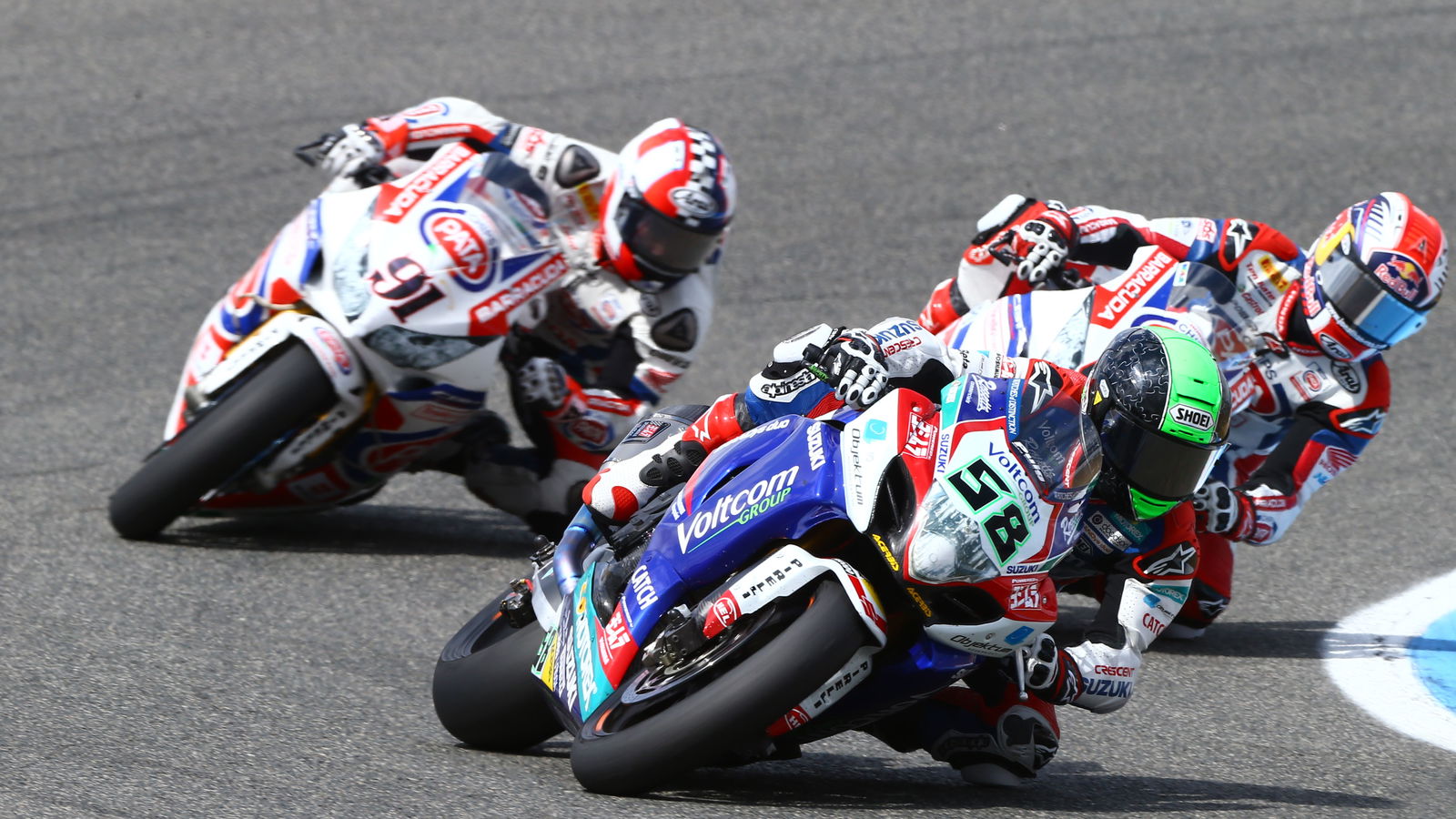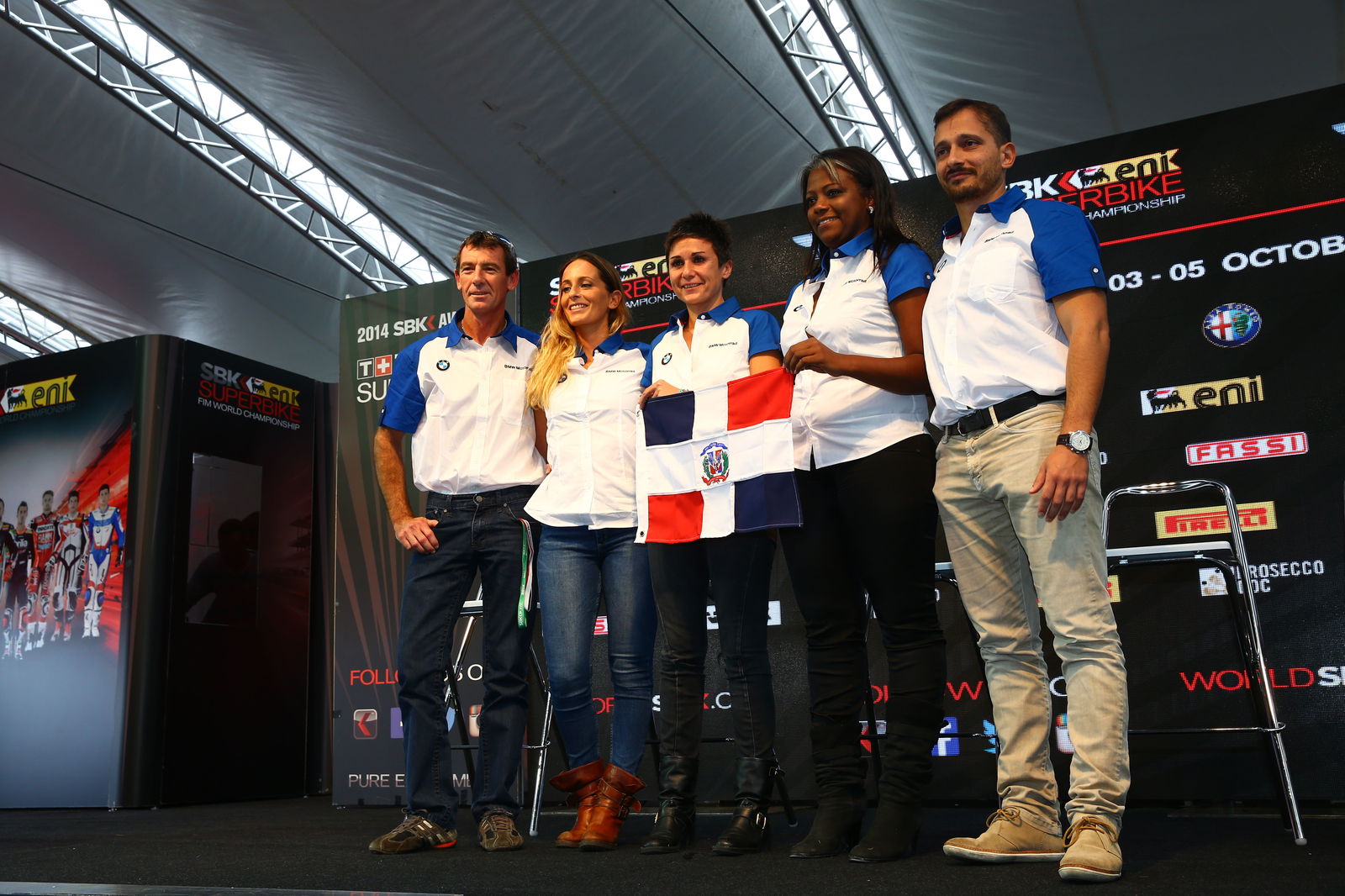WSBK - Q&A: Davide Gentile (Eugene Laverty's Data Analyst)

NB: Interview conducted before Eugene Laverty confirmed he will be racing in MotoGP next season
Crash.net:
Hi Davidee, what's your background?
Davide Gentile:
I'm actually Italian and here in the team I'm known as Italian Dave.
I would say that I'm a biker and a long time ago I was also a racer, not a road racer, but I did quite a few years in off road and enduro when I was young.
I still ride bikes and have owned many great bikes like a Yamaha R1 and an RG500 Gamma but nowadays I've got a Ducati Monster S4 at home and if the weather's nice I like to take it out for a spin. The weather has to be good though because I'm not a British biker!
Crash.net:
When did you stop racing?
Davide Gentile:
Oh that was a long time ago, maybe 1992. It's safe to say that I was no Valentino Rossi but I did pretty well in the Italian Championship so it wasn't without hope. In the end I broke the main bone in my leg and also destroyed my knee so my career was over but maybe given my overall level I didn't lose so much.
Crash.net:
So how did you become a data analyst?
Davide Gentile:
I'm actually a mechanical engineer, I took my degree in mechanical engineering at Trieste and don't have a background in electronics. When I did that I was doing all sorts of projects to do with internal combustion engines but particularly liked working with bike engines.
Then at the end of my course I had the opportunity to work with the Aprilia race team as a placement to complete my degree. Aprilia had a sort of collaboration with Trieste for this kind of thing.
At the time they were working on the 125 and 250 GP bikes and also the first 400 twin which later became the much feared cube. I remember when they started the first cube motor, that was an absolute monster, It was terrible!
I went there to work on the RSV1000 and the propagation of the combustion pressure wave for it. I was working on that and then they needed someone to work in the race team and asked me if I was interested and it's safe to say that I was very interested.
In the race team at the time they were studying a new management system which worked from the bike data logger information. They were building a program which would display and manage the various parameter you could get, I was lucky to get involved in it, enjoyed my time there and continued working in that field. That's why a mechanical engineer is working with electronics.
Crash.net:
If someone wants to get into bike data analysis, is it better to come from an engineering or IT background?
Davide Gentile:
In my opinion from a mechanical background because you need to know all about bike dynamics and thermo dynamics. You need to understand how forces interact on a bike and riding them helps too. But having said that, my job is still all numbers.
It's the relationship between the numbers I see and what is really happening on the bike. Acceleration, grip and torque are things that you need to understand at a practical level though.
Crash.net:
Have you never had a 'normal' job?
Davide Gentile:
Well, just after my studies I started to work in a factory which made bolts. It wasn't a nice job but luckily after 3 months Ducati asked me over for interview.
Crash.net:
Didn't you say you worked at Aprilia?
Davide Gentile:
Yes, yes I did some seasons with them working with Mattia Pasini and Randy de Puniet, before he was tame but I was working and studying at the same time. When I finished studying I then started at the bolt factory because I thought it would be a good stable job but getting up at 7 every day and working until 5 just wasn't my thing and the interview with Ducati rescued me
Crash.net:
Do you have any job security as a Data Analyst?
Davide Gentile:
On paper, job security in racing is pretty bad. Contracts are often 1 year and a good one would be for 2 years, that's racing. But I know that as a Data Analyst at the end of the season you can always find a job. Maybe I'm lucky because there aren't so many people doing my job.
I've also done more of a crew chief job like at Ducati recently when I was working with Davidee Giugliano. I was being a crew chief but also taking care of the strategies. It was an interesting experience because Davidee is one of those riders that you know is giving everything he's got but at the same time he's not easy to work with. When things aren't going well he gets pretty angry and can be difficult to manage but once you win his trust he's a great guy to know and I think he still loves me!
Working hours vary a lot but this part of the season is the busiest because I'm preparing things to test at the end of the season so not only do I work on the races but I'm also getting ready for testing.
I believe that I'm paid pretty well, I don't earn millions but my pay is comparable with a crew chief's. There are not so many people with my skills so luckily I that makes my skills valuable.
Here I'm lucky because I'm developing my own system and can do whatever I want whereas if you worked at Repsol Honda you'd be working on someone else's stuff. I love that creative challenge.
Crash.net:
Which other riders did you enjoy working with?
Davide Gentile:
I enjoyed being with Ben Bostrom in AMA but unfortunately he had health problems that year our biggest problem was Ben Spies though, he was just destroying everyone.
Crash.net:
By the way, do you think that Ben Spies' incredible performance when he came to WSBK was due to machine advantage and active suspension, or was it Ben's ability as a rider?
Davide Gentile:
It was the first year with the Yamaha big bang and it wasn't so good and a good rider like Tom Sykes was in 6th or 7th but when it comes to Ben, I've never seen a rider perform so strongly. I think it wasn't to do with bike or electronics, because the Yamaha package wasn't that good. It was all down to Ben and how he rode that year.
Many teams were using active suspension and as far as I'm concerned it was a lot of work for a very small benefit. It was called active but it just meant that you could alter the clickers without coming into the garage. It was done section by section and for example when coming into a corner, it was the trick to close all compression in braking and so forth. It was a help but not that big.
Crash.net:
WSBK is now using Motec but your experience is on Magnetti Marelli, do the skills transfer?
Davide Gentile:
We're actually having to write some new strategies for the Motec but the basic logic of the strategies is the same. Also Motec have produced a software kit which does the same. For me, the final result is similar.
The speed of the processor is so fast anyway that even with a cheaper unit you can still have strategies which will work faster than any rider will feel. The Marelli ECU has 2 or 3 CPU's and the Motec has a simpler one but they are both more than powerful enough.
At the moment we have a lot of work to do transferring all the strategies to the cheaper ECU we're using next season. They're both Motec but the platform is different. It's a long and boring job.
The MM system has more powerful hardware and because it has a stronger ECU we were writing some pretty heavy code. Strategies will be written in in computer code such as C++, I don't do the coding, I just put together the procedure and hand that to the coders.
To put together procedures and write code, you have to go pretty deep inside the software and you need to know all the terms and functions needed to speak to the ECU for example how to take this or that channel, repeat until this value is reached and so forth.
My job is above that in that I deal with more real world procedures and for example if I want to build a traction control I would choose which channel to use and how to build the strategy.
Crash.net:
What do you mean by channel?
Davide Gentile:
The channel is simply the measure, such as speed or pitch angle. The channel is a variable that you mix together to give you an output that thus gives you a control.
A quick example is how traction control works. A simply way to write a traction control would be to compare the front wheel speed with the rear wheel speed.
The difference in percent gives you a target and you can put a threshold on that. You can then establish an error as being a deviation from the threshold. So if your threshold is 5% away from the target you can say that you don't want there to be more than that difference in spin.
Once the spin goes over 5% you can have a value which will tell you how far you are from your target and what you do will depend on how far away it is. You would build a control to keep your spin within target.
There are many ways to modulate the torque but that control would be written to use for example spark advance timing to bring the engine back to get you within your target. You would use different methods to hold the motor back depending on how far from the target you are. So for example if it were over 3% over you might also weaken the spark.
Unfortunately it's a little more complicated than that though because you need to see what's going on now but you also have to wait to for the next result and compare the 2. You need to know the trend and if it's getting better or worse. That's called the integral path.
Those are the 3 terms of a control. The first is the proportional which means how far you are currently from your target, the second is the derivative which is how your trend is going and the third is the integral which is to check whether what you are doing is having an effect. These will be the elements of a control.
I would put together this strategy and send it to a developer and we would then spend time debugging it.
Crash.net:
Let's say I want to put Motec electronics onto my standard road going SV1000, what would I do?
Davide Gentile:
You would buy the ECU and software but what you get will depend on how much you pay.
If you then want to use such things as traction control you would then need some kind of management interface which would allow you to write and manipulate controls, but honestly you do need the skills to be able to manipulate them or you would just be moving numbers without having any idea of what's going on.
By default your ECU will need to have all the strategies in it to even start your bike such as fuel and advance maps and every bike will need a different one.
You can buy the ECU with that included or you can just buy an empty box. If it's empty you could even spend a whole year to put together a full set of basic management strategies.
Once you have the basic strategies worked out for lets say normal engine use you could then start working on and adding in your traction control, wheelie control and engine braking
Crash.net:
Are those the main things you would work on in a racing context?
Davide Gentile:
Yes, exactly but you have to remember that behind these three important settings is torque management. Every point of rpm and throttle position must be fully understood so that you understand how the engine produces torque and therefore how you can work on those strategies.
Those strategies will be set per corner but also according to lean angle. You have to understand that the rear tyre isn't round, and the rear speed measure will depend on what part of the tyre is in contact with the track. Another control which would be overlaid on that would be one to make allowances for tyre wear.
Some strategies would be what's called an offset, where you are making a constant adjustment in the same direction such as allowing for tyre wear.
Crash.net:
Do you work with only Eugene?
Davide Gentile:
When we're testing I work with Eugene and Alex to have more information but in a race situation I only work with Eugene.
After a run Eugene will come in and report his reactions directly to me and I can then make any changes I think are necessary, adjust our program and then load it into the ECU.
The rider will always speak in terms of how something feels so you have to know the rider so that you can convert what they say into terms which are a physical phenomenon. You really need to know the rider and how they talk. This is one of the great skills of my job.
When I was first working with Eugene I found the Irish accent a little difficult but I can now understand him well, Eugene's father is a different matter though!
Crash.net:
What kind of things does Eugene concentrate on?
Davide Gentile:
Eugene is really sensitive to engine braking because his riding style is like that for a 2 stroke. He needs really accurate engine braking settings so that the engine spins freely into a corner and the easiest way of controlling torque into corners is just by opening the butterfly.
Honestly for performance engine braking is the most important aspect because it's much easier to lose time going in to a corner than gain anything coming out.
You can easily gain half a second going in with good engine braking but even with the best traction control in the world you won't gain more than 2 tenths coming out. Riding without traction isn't necessarily such a problem for a fast lap.
The main thing with traction control is that it saves the tyre in a longer run, but for a lap time it's the engine braking that counts. We've got a pretty complex strategy for that and we're still working on that.
Crash.net:
How about Alex?
Davide Gentile:
Eugene likes smoother torque delivery, traction control and engine braking but Alex likes everything more aggressive. He tends to like all the power as soon as he can get it, not much traction control and a strong setting on the engine brake. He's more aggressive going in and out of corners, has less corner speed and generally has a more spectacular style. It's a more normal superbike style.
Crash.net:
That makes it sound as if Eugene's style would be quite suitable for MotoGP?
Davide Gentile:
Yes absolutely, it's smoother and with a higher corner speed. Eugene is still trying to find a good position there but we still hope that he'll stay here.
Crash.net:
Why did your performance drop off after Philip Island?
Davide Gentile:
We knew that would be a good track for the Suzuki because it isn't stop and start and that suits our engine, it's got a long stroke and has good torque at the bottom end. You don't need huge power at PI to be fast, if you look at WSBK and MotoGP times they're pretty similar.
Laguna has similar characteristics and we should have done better there but we had an engine issue and in the second one we had many restarts and Eugene isn't a good starter. Eugene is best off with a good race distance to make the difference.
Starting is more of a mechanical aspect and Eugene is struggling with the Suzuki's clutch. It is really a better clutch for aggressive use and that's why Alex is doing well with it. Unfortunately the rules dictate that you can't manage the clutch.
Crash.net:
Where is your motivation in racing, the mental problem solving aspect or the competition on track?
Davide Gentile:
I have to say both. When you're on track you get totally involved in the adrenaline side of things and do anything you can to get those last bits of improvement.
The engineering and numbers side of things is also something I can't leave behind. I tend to watch riders very carefully during the race so that I can compare with what the riders are saying. Watching the race is also kind of like getting data.
You can get new ideas for strategies at races which you can then use on the test bench and take to the test track
Crash.net:
We have a poster here on Crash.net called TalentFan who believes that racing would be improved by removing virtually all electronics, as an electronics man how would you answer that?
Davide Gentile:
My answer would be 'safety'.
Even road bikes have electronics to make them safer nowadays so why not have that on race bikes too?
The main aim of electronics is safety with greater speed as a byproduct but with greater speed you again need greater safety.
Crash.net:
Thanks Davide.
Davide Gentile:
No problems.

